(Doc) Assignment on Leadership and Management for Service Industries
VerifiedAdded on 2021/02/21
|13
|4588
|765
AI Summary
Contribute Materials
Your contribution can guide someone’s learning journey. Share your
documents today.
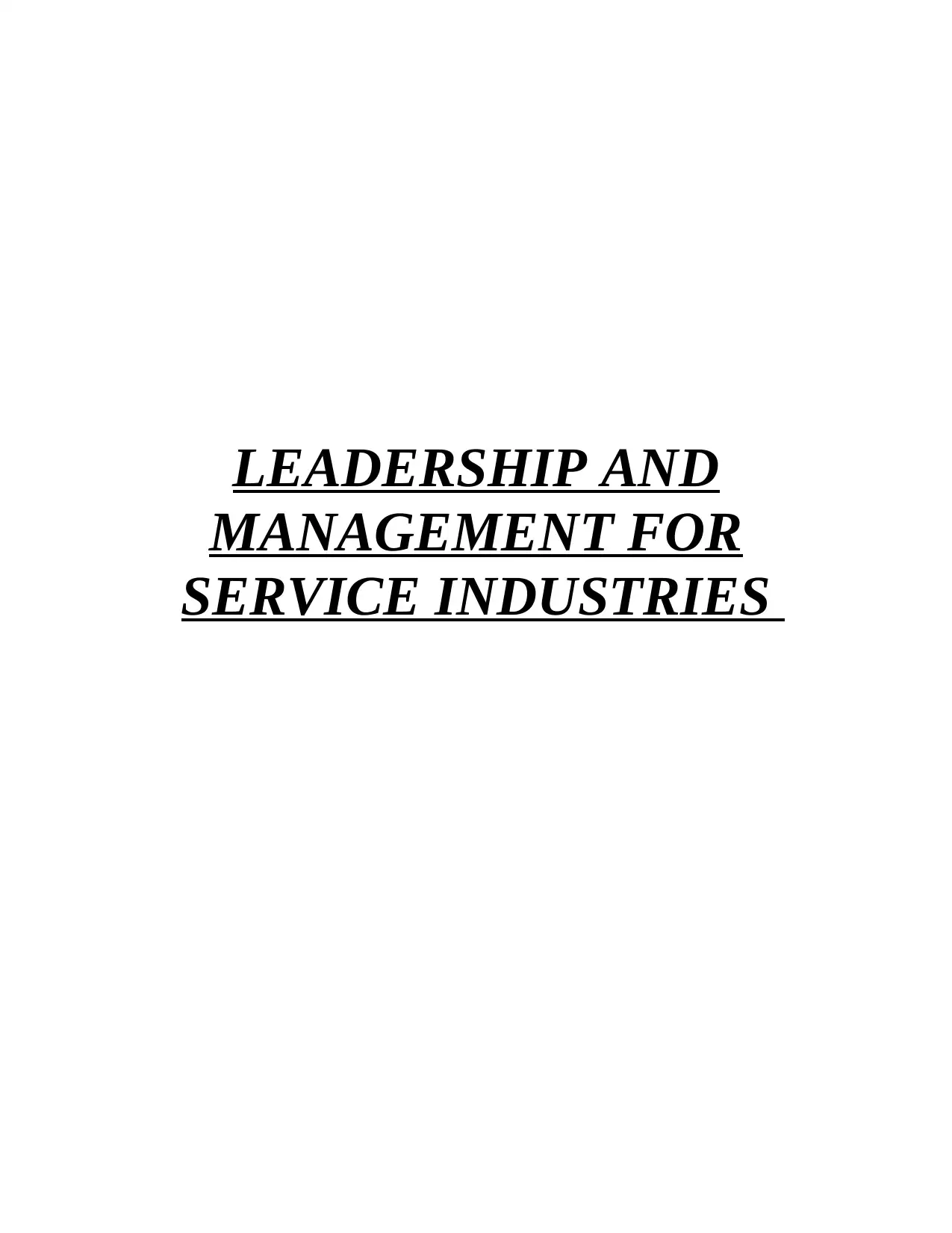
LEADERSHIP AND
MANAGEMENT FOR
SERVICE INDUSTRIES
MANAGEMENT FOR
SERVICE INDUSTRIES
Secure Best Marks with AI Grader
Need help grading? Try our AI Grader for instant feedback on your assignments.
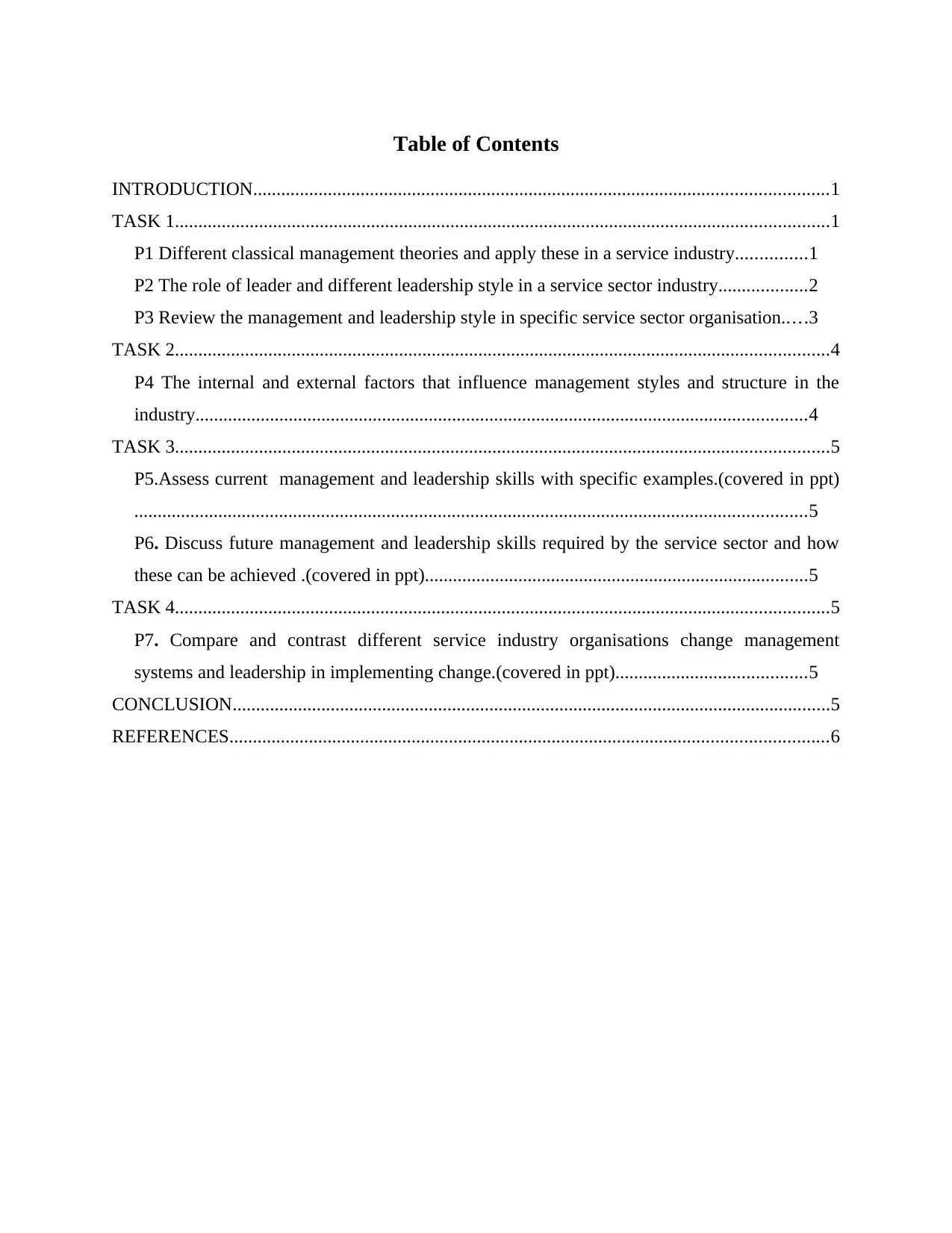
Table of Contents
INTRODUCTION...........................................................................................................................1
TASK 1............................................................................................................................................1
P1 Different classical management theories and apply these in a service industry...............1
P2 The role of leader and different leadership style in a service sector industry...................2
P3 Review the management and leadership style in specific service sector organisation.....3
TASK 2............................................................................................................................................4
P4 The internal and external factors that influence management styles and structure in the
industry...................................................................................................................................4
TASK 3............................................................................................................................................5
P5.Assess current management and leadership skills with specific examples.(covered in ppt)
................................................................................................................................................5
P6. Discuss future management and leadership skills required by the service sector and how
these can be achieved .(covered in ppt)..................................................................................5
TASK 4............................................................................................................................................5
P7. Compare and contrast different service industry organisations change management
systems and leadership in implementing change.(covered in ppt).........................................5
CONCLUSION................................................................................................................................5
REFERENCES................................................................................................................................6
INTRODUCTION...........................................................................................................................1
TASK 1............................................................................................................................................1
P1 Different classical management theories and apply these in a service industry...............1
P2 The role of leader and different leadership style in a service sector industry...................2
P3 Review the management and leadership style in specific service sector organisation.....3
TASK 2............................................................................................................................................4
P4 The internal and external factors that influence management styles and structure in the
industry...................................................................................................................................4
TASK 3............................................................................................................................................5
P5.Assess current management and leadership skills with specific examples.(covered in ppt)
................................................................................................................................................5
P6. Discuss future management and leadership skills required by the service sector and how
these can be achieved .(covered in ppt)..................................................................................5
TASK 4............................................................................................................................................5
P7. Compare and contrast different service industry organisations change management
systems and leadership in implementing change.(covered in ppt).........................................5
CONCLUSION................................................................................................................................5
REFERENCES................................................................................................................................6
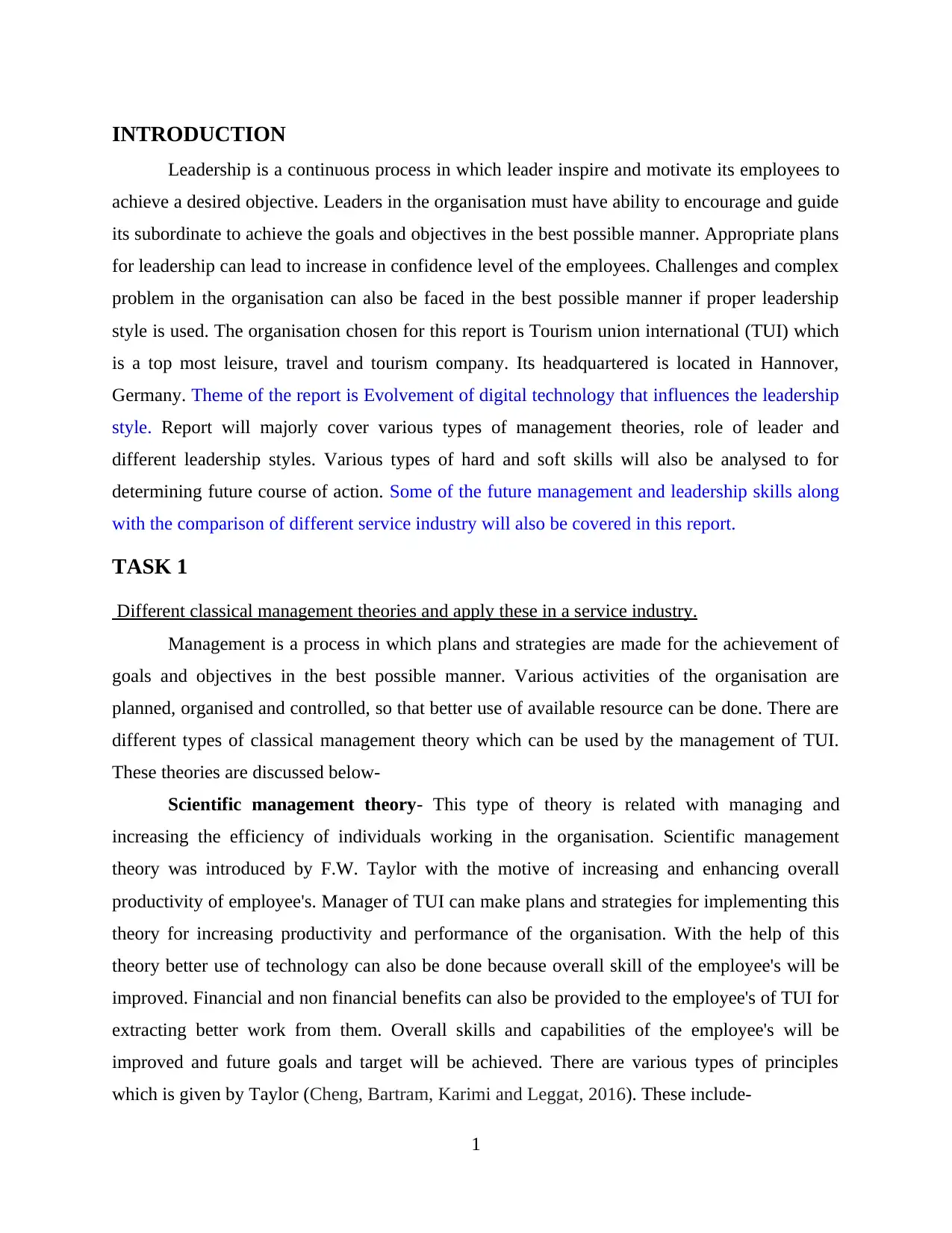
INTRODUCTION
Leadership is a continuous process in which leader inspire and motivate its employees to
achieve a desired objective. Leaders in the organisation must have ability to encourage and guide
its subordinate to achieve the goals and objectives in the best possible manner. Appropriate plans
for leadership can lead to increase in confidence level of the employees. Challenges and complex
problem in the organisation can also be faced in the best possible manner if proper leadership
style is used. The organisation chosen for this report is Tourism union international (TUI) which
is a top most leisure, travel and tourism company. Its headquartered is located in Hannover,
Germany. Theme of the report is Evolvement of digital technology that influences the leadership
style. Report will majorly cover various types of management theories, role of leader and
different leadership styles. Various types of hard and soft skills will also be analysed to for
determining future course of action. Some of the future management and leadership skills along
with the comparison of different service industry will also be covered in this report.
TASK 1
Different classical management theories and apply these in a service industry.
Management is a process in which plans and strategies are made for the achievement of
goals and objectives in the best possible manner. Various activities of the organisation are
planned, organised and controlled, so that better use of available resource can be done. There are
different types of classical management theory which can be used by the management of TUI.
These theories are discussed below-
Scientific management theory- This type of theory is related with managing and
increasing the efficiency of individuals working in the organisation. Scientific management
theory was introduced by F.W. Taylor with the motive of increasing and enhancing overall
productivity of employee's. Manager of TUI can make plans and strategies for implementing this
theory for increasing productivity and performance of the organisation. With the help of this
theory better use of technology can also be done because overall skill of the employee's will be
improved. Financial and non financial benefits can also be provided to the employee's of TUI for
extracting better work from them. Overall skills and capabilities of the employee's will be
improved and future goals and target will be achieved. There are various types of principles
which is given by Taylor (Cheng, Bartram, Karimi and Leggat, 2016). These include-
1
Leadership is a continuous process in which leader inspire and motivate its employees to
achieve a desired objective. Leaders in the organisation must have ability to encourage and guide
its subordinate to achieve the goals and objectives in the best possible manner. Appropriate plans
for leadership can lead to increase in confidence level of the employees. Challenges and complex
problem in the organisation can also be faced in the best possible manner if proper leadership
style is used. The organisation chosen for this report is Tourism union international (TUI) which
is a top most leisure, travel and tourism company. Its headquartered is located in Hannover,
Germany. Theme of the report is Evolvement of digital technology that influences the leadership
style. Report will majorly cover various types of management theories, role of leader and
different leadership styles. Various types of hard and soft skills will also be analysed to for
determining future course of action. Some of the future management and leadership skills along
with the comparison of different service industry will also be covered in this report.
TASK 1
Different classical management theories and apply these in a service industry.
Management is a process in which plans and strategies are made for the achievement of
goals and objectives in the best possible manner. Various activities of the organisation are
planned, organised and controlled, so that better use of available resource can be done. There are
different types of classical management theory which can be used by the management of TUI.
These theories are discussed below-
Scientific management theory- This type of theory is related with managing and
increasing the efficiency of individuals working in the organisation. Scientific management
theory was introduced by F.W. Taylor with the motive of increasing and enhancing overall
productivity of employee's. Manager of TUI can make plans and strategies for implementing this
theory for increasing productivity and performance of the organisation. With the help of this
theory better use of technology can also be done because overall skill of the employee's will be
improved. Financial and non financial benefits can also be provided to the employee's of TUI for
extracting better work from them. Overall skills and capabilities of the employee's will be
improved and future goals and target will be achieved. There are various types of principles
which is given by Taylor (Cheng, Bartram, Karimi and Leggat, 2016). These include-
1
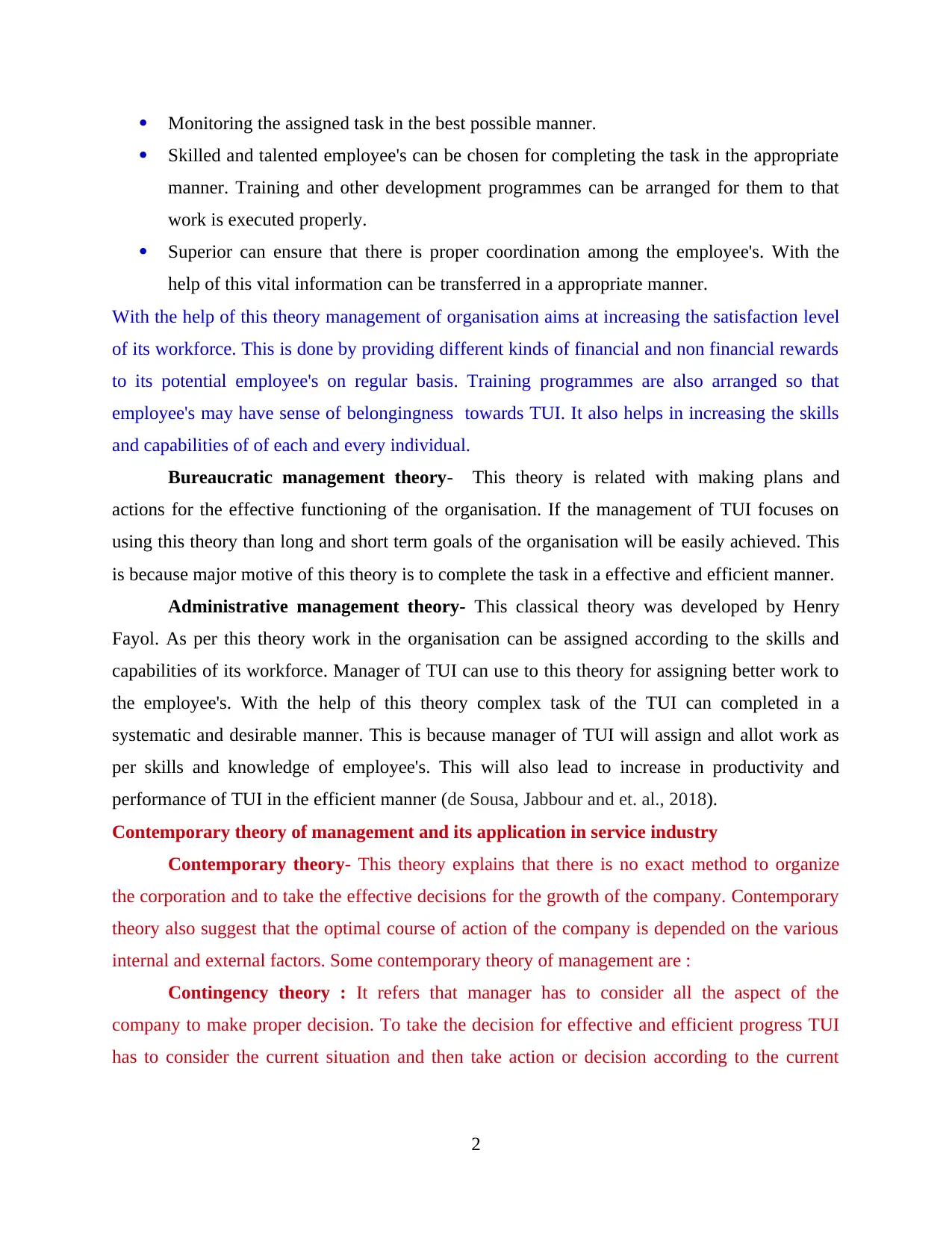
Monitoring the assigned task in the best possible manner.
Skilled and talented employee's can be chosen for completing the task in the appropriate
manner. Training and other development programmes can be arranged for them to that
work is executed properly.
Superior can ensure that there is proper coordination among the employee's. With the
help of this vital information can be transferred in a appropriate manner.
With the help of this theory management of organisation aims at increasing the satisfaction level
of its workforce. This is done by providing different kinds of financial and non financial rewards
to its potential employee's on regular basis. Training programmes are also arranged so that
employee's may have sense of belongingness towards TUI. It also helps in increasing the skills
and capabilities of of each and every individual.
Bureaucratic management theory- This theory is related with making plans and
actions for the effective functioning of the organisation. If the management of TUI focuses on
using this theory than long and short term goals of the organisation will be easily achieved. This
is because major motive of this theory is to complete the task in a effective and efficient manner.
Administrative management theory- This classical theory was developed by Henry
Fayol. As per this theory work in the organisation can be assigned according to the skills and
capabilities of its workforce. Manager of TUI can use to this theory for assigning better work to
the employee's. With the help of this theory complex task of the TUI can completed in a
systematic and desirable manner. This is because manager of TUI will assign and allot work as
per skills and knowledge of employee's. This will also lead to increase in productivity and
performance of TUI in the efficient manner (de Sousa, Jabbour and et. al., 2018).
Contemporary theory of management and its application in service industry
Contemporary theory- This theory explains that there is no exact method to organize
the corporation and to take the effective decisions for the growth of the company. Contemporary
theory also suggest that the optimal course of action of the company is depended on the various
internal and external factors. Some contemporary theory of management are :
Contingency theory : It refers that manager has to consider all the aspect of the
company to make proper decision. To take the decision for effective and efficient progress TUI
has to consider the current situation and then take action or decision according to the current
2
Skilled and talented employee's can be chosen for completing the task in the appropriate
manner. Training and other development programmes can be arranged for them to that
work is executed properly.
Superior can ensure that there is proper coordination among the employee's. With the
help of this vital information can be transferred in a appropriate manner.
With the help of this theory management of organisation aims at increasing the satisfaction level
of its workforce. This is done by providing different kinds of financial and non financial rewards
to its potential employee's on regular basis. Training programmes are also arranged so that
employee's may have sense of belongingness towards TUI. It also helps in increasing the skills
and capabilities of of each and every individual.
Bureaucratic management theory- This theory is related with making plans and
actions for the effective functioning of the organisation. If the management of TUI focuses on
using this theory than long and short term goals of the organisation will be easily achieved. This
is because major motive of this theory is to complete the task in a effective and efficient manner.
Administrative management theory- This classical theory was developed by Henry
Fayol. As per this theory work in the organisation can be assigned according to the skills and
capabilities of its workforce. Manager of TUI can use to this theory for assigning better work to
the employee's. With the help of this theory complex task of the TUI can completed in a
systematic and desirable manner. This is because manager of TUI will assign and allot work as
per skills and knowledge of employee's. This will also lead to increase in productivity and
performance of TUI in the efficient manner (de Sousa, Jabbour and et. al., 2018).
Contemporary theory of management and its application in service industry
Contemporary theory- This theory explains that there is no exact method to organize
the corporation and to take the effective decisions for the growth of the company. Contemporary
theory also suggest that the optimal course of action of the company is depended on the various
internal and external factors. Some contemporary theory of management are :
Contingency theory : It refers that manager has to consider all the aspect of the
company to make proper decision. To take the decision for effective and efficient progress TUI
has to consider the current situation and then take action or decision according to the current
2
Secure Best Marks with AI Grader
Need help grading? Try our AI Grader for instant feedback on your assignments.
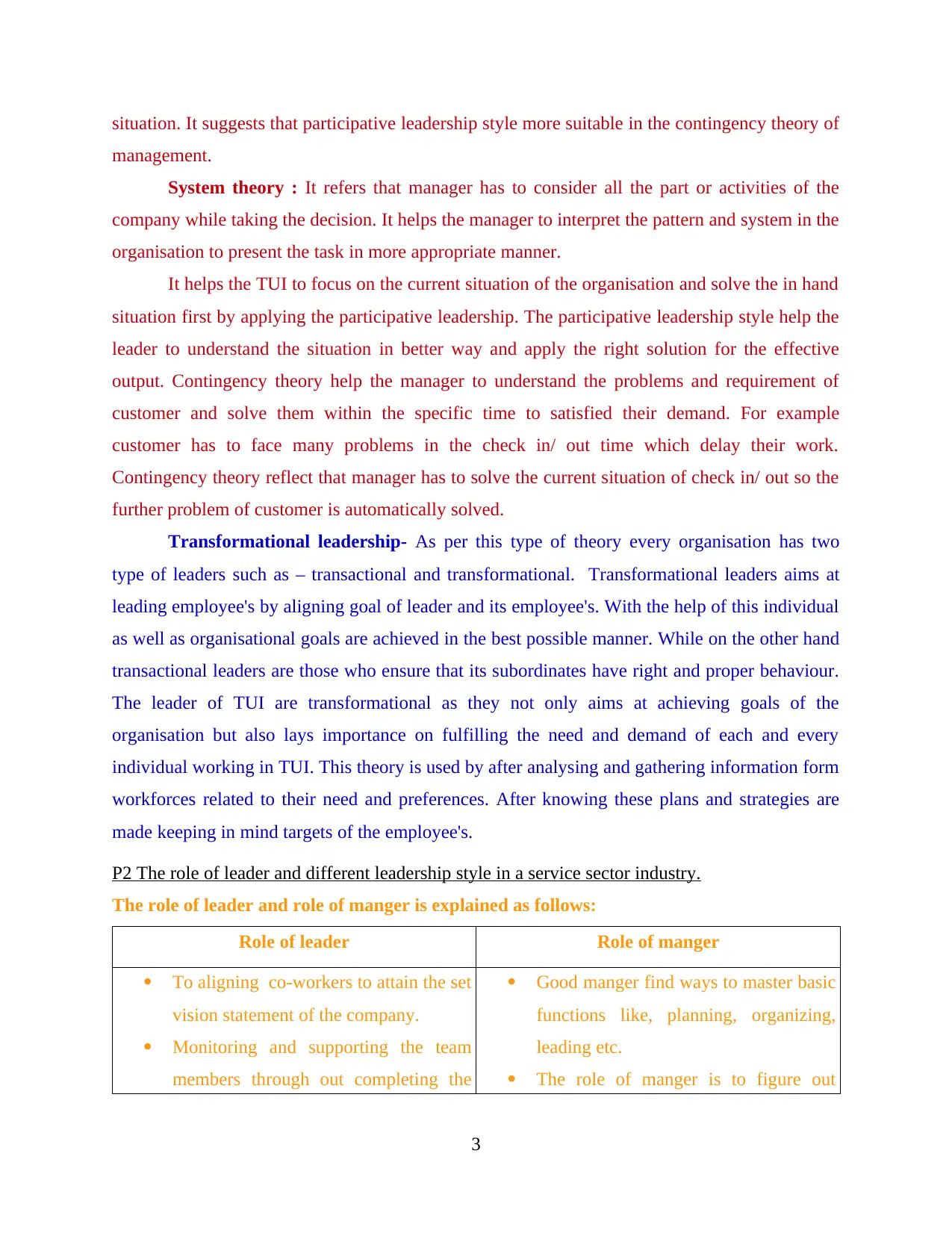
situation. It suggests that participative leadership style more suitable in the contingency theory of
management.
System theory : It refers that manager has to consider all the part or activities of the
company while taking the decision. It helps the manager to interpret the pattern and system in the
organisation to present the task in more appropriate manner.
It helps the TUI to focus on the current situation of the organisation and solve the in hand
situation first by applying the participative leadership. The participative leadership style help the
leader to understand the situation in better way and apply the right solution for the effective
output. Contingency theory help the manager to understand the problems and requirement of
customer and solve them within the specific time to satisfied their demand. For example
customer has to face many problems in the check in/ out time which delay their work.
Contingency theory reflect that manager has to solve the current situation of check in/ out so the
further problem of customer is automatically solved.
Transformational leadership- As per this type of theory every organisation has two
type of leaders such as – transactional and transformational. Transformational leaders aims at
leading employee's by aligning goal of leader and its employee's. With the help of this individual
as well as organisational goals are achieved in the best possible manner. While on the other hand
transactional leaders are those who ensure that its subordinates have right and proper behaviour.
The leader of TUI are transformational as they not only aims at achieving goals of the
organisation but also lays importance on fulfilling the need and demand of each and every
individual working in TUI. This theory is used by after analysing and gathering information form
workforces related to their need and preferences. After knowing these plans and strategies are
made keeping in mind targets of the employee's.
P2 The role of leader and different leadership style in a service sector industry.
The role of leader and role of manger is explained as follows:
Role of leader Role of manger
To aligning co-workers to attain the set
vision statement of the company.
Monitoring and supporting the team
members through out completing the
Good manger find ways to master basic
functions like, planning, organizing,
leading etc.
The role of manger is to figure out
3
management.
System theory : It refers that manager has to consider all the part or activities of the
company while taking the decision. It helps the manager to interpret the pattern and system in the
organisation to present the task in more appropriate manner.
It helps the TUI to focus on the current situation of the organisation and solve the in hand
situation first by applying the participative leadership. The participative leadership style help the
leader to understand the situation in better way and apply the right solution for the effective
output. Contingency theory help the manager to understand the problems and requirement of
customer and solve them within the specific time to satisfied their demand. For example
customer has to face many problems in the check in/ out time which delay their work.
Contingency theory reflect that manager has to solve the current situation of check in/ out so the
further problem of customer is automatically solved.
Transformational leadership- As per this type of theory every organisation has two
type of leaders such as – transactional and transformational. Transformational leaders aims at
leading employee's by aligning goal of leader and its employee's. With the help of this individual
as well as organisational goals are achieved in the best possible manner. While on the other hand
transactional leaders are those who ensure that its subordinates have right and proper behaviour.
The leader of TUI are transformational as they not only aims at achieving goals of the
organisation but also lays importance on fulfilling the need and demand of each and every
individual working in TUI. This theory is used by after analysing and gathering information form
workforces related to their need and preferences. After knowing these plans and strategies are
made keeping in mind targets of the employee's.
P2 The role of leader and different leadership style in a service sector industry.
The role of leader and role of manger is explained as follows:
Role of leader Role of manger
To aligning co-workers to attain the set
vision statement of the company.
Monitoring and supporting the team
members through out completing the
Good manger find ways to master basic
functions like, planning, organizing,
leading etc.
The role of manger is to figure out
3
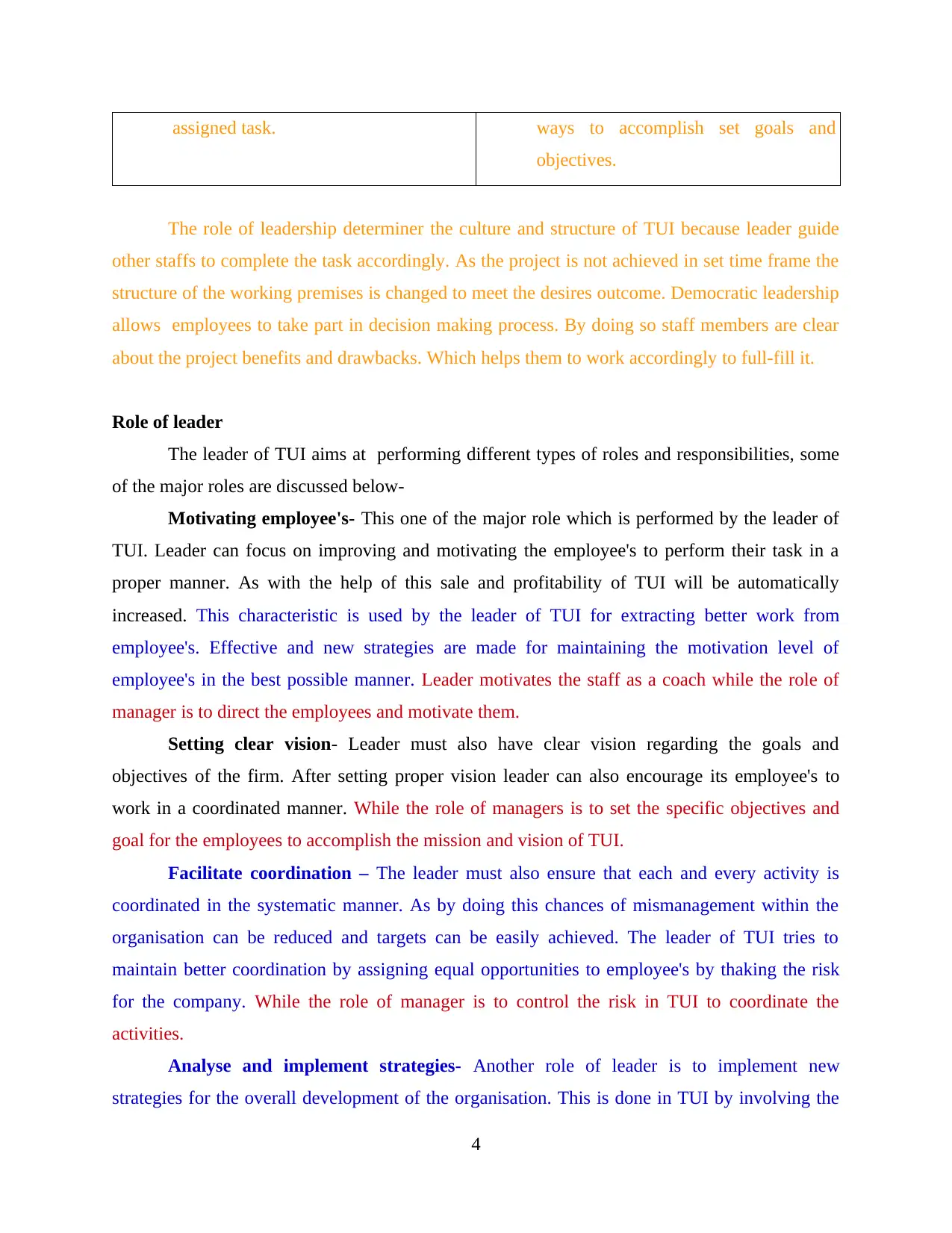
assigned task. ways to accomplish set goals and
objectives.
The role of leadership determiner the culture and structure of TUI because leader guide
other staffs to complete the task accordingly. As the project is not achieved in set time frame the
structure of the working premises is changed to meet the desires outcome. Democratic leadership
allows employees to take part in decision making process. By doing so staff members are clear
about the project benefits and drawbacks. Which helps them to work accordingly to full-fill it.
Role of leader
The leader of TUI aims at performing different types of roles and responsibilities, some
of the major roles are discussed below-
Motivating employee's- This one of the major role which is performed by the leader of
TUI. Leader can focus on improving and motivating the employee's to perform their task in a
proper manner. As with the help of this sale and profitability of TUI will be automatically
increased. This characteristic is used by the leader of TUI for extracting better work from
employee's. Effective and new strategies are made for maintaining the motivation level of
employee's in the best possible manner. Leader motivates the staff as a coach while the role of
manager is to direct the employees and motivate them.
Setting clear vision- Leader must also have clear vision regarding the goals and
objectives of the firm. After setting proper vision leader can also encourage its employee's to
work in a coordinated manner. While the role of managers is to set the specific objectives and
goal for the employees to accomplish the mission and vision of TUI.
Facilitate coordination – The leader must also ensure that each and every activity is
coordinated in the systematic manner. As by doing this chances of mismanagement within the
organisation can be reduced and targets can be easily achieved. The leader of TUI tries to
maintain better coordination by assigning equal opportunities to employee's by thaking the risk
for the company. While the role of manager is to control the risk in TUI to coordinate the
activities.
Analyse and implement strategies- Another role of leader is to implement new
strategies for the overall development of the organisation. This is done in TUI by involving the
4
objectives.
The role of leadership determiner the culture and structure of TUI because leader guide
other staffs to complete the task accordingly. As the project is not achieved in set time frame the
structure of the working premises is changed to meet the desires outcome. Democratic leadership
allows employees to take part in decision making process. By doing so staff members are clear
about the project benefits and drawbacks. Which helps them to work accordingly to full-fill it.
Role of leader
The leader of TUI aims at performing different types of roles and responsibilities, some
of the major roles are discussed below-
Motivating employee's- This one of the major role which is performed by the leader of
TUI. Leader can focus on improving and motivating the employee's to perform their task in a
proper manner. As with the help of this sale and profitability of TUI will be automatically
increased. This characteristic is used by the leader of TUI for extracting better work from
employee's. Effective and new strategies are made for maintaining the motivation level of
employee's in the best possible manner. Leader motivates the staff as a coach while the role of
manager is to direct the employees and motivate them.
Setting clear vision- Leader must also have clear vision regarding the goals and
objectives of the firm. After setting proper vision leader can also encourage its employee's to
work in a coordinated manner. While the role of managers is to set the specific objectives and
goal for the employees to accomplish the mission and vision of TUI.
Facilitate coordination – The leader must also ensure that each and every activity is
coordinated in the systematic manner. As by doing this chances of mismanagement within the
organisation can be reduced and targets can be easily achieved. The leader of TUI tries to
maintain better coordination by assigning equal opportunities to employee's by thaking the risk
for the company. While the role of manager is to control the risk in TUI to coordinate the
activities.
Analyse and implement strategies- Another role of leader is to implement new
strategies for the overall development of the organisation. This is done in TUI by involving the
4
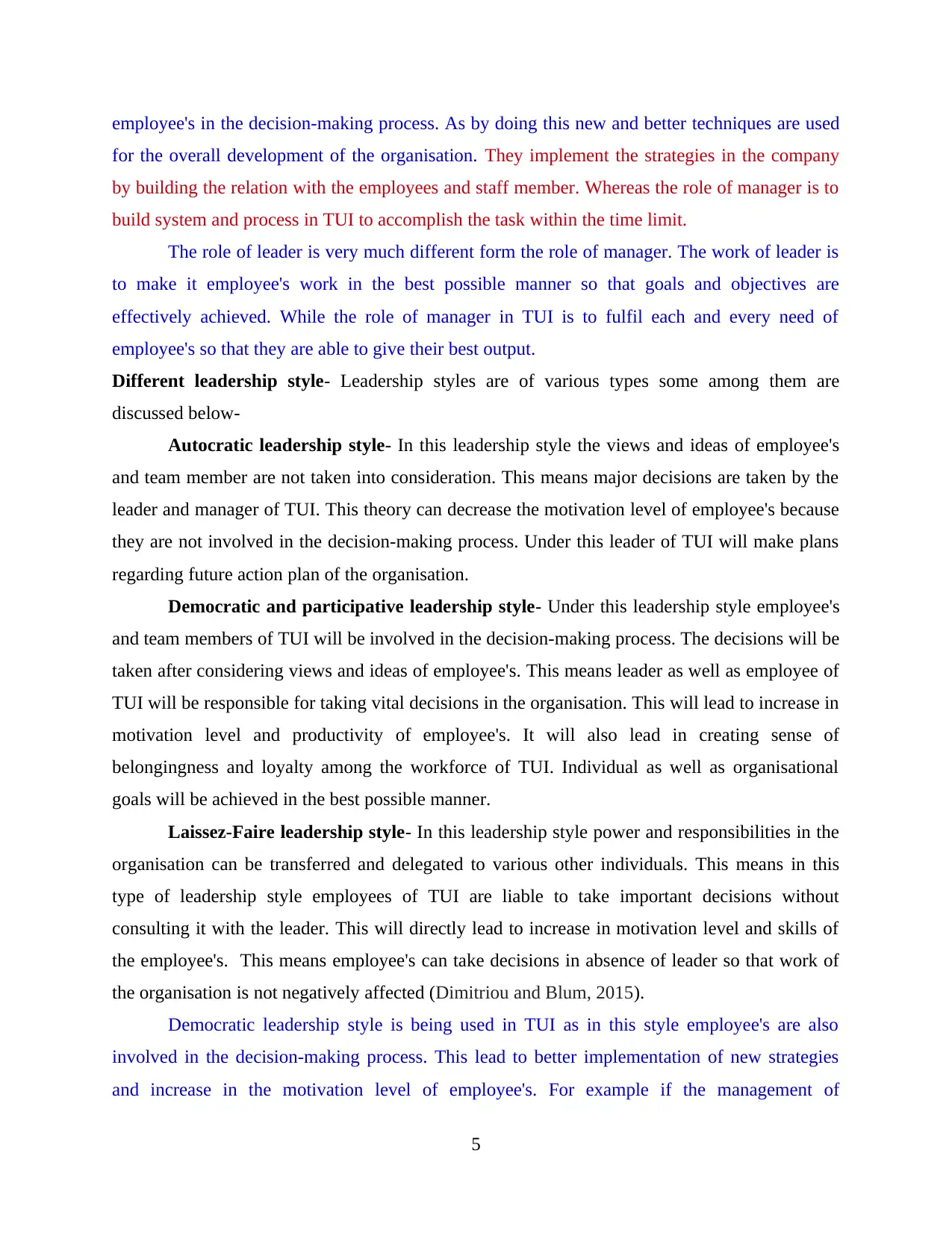
employee's in the decision-making process. As by doing this new and better techniques are used
for the overall development of the organisation. They implement the strategies in the company
by building the relation with the employees and staff member. Whereas the role of manager is to
build system and process in TUI to accomplish the task within the time limit.
The role of leader is very much different form the role of manager. The work of leader is
to make it employee's work in the best possible manner so that goals and objectives are
effectively achieved. While the role of manager in TUI is to fulfil each and every need of
employee's so that they are able to give their best output.
Different leadership style- Leadership styles are of various types some among them are
discussed below-
Autocratic leadership style- In this leadership style the views and ideas of employee's
and team member are not taken into consideration. This means major decisions are taken by the
leader and manager of TUI. This theory can decrease the motivation level of employee's because
they are not involved in the decision-making process. Under this leader of TUI will make plans
regarding future action plan of the organisation.
Democratic and participative leadership style- Under this leadership style employee's
and team members of TUI will be involved in the decision-making process. The decisions will be
taken after considering views and ideas of employee's. This means leader as well as employee of
TUI will be responsible for taking vital decisions in the organisation. This will lead to increase in
motivation level and productivity of employee's. It will also lead in creating sense of
belongingness and loyalty among the workforce of TUI. Individual as well as organisational
goals will be achieved in the best possible manner.
Laissez-Faire leadership style- In this leadership style power and responsibilities in the
organisation can be transferred and delegated to various other individuals. This means in this
type of leadership style employees of TUI are liable to take important decisions without
consulting it with the leader. This will directly lead to increase in motivation level and skills of
the employee's. This means employee's can take decisions in absence of leader so that work of
the organisation is not negatively affected (Dimitriou and Blum, 2015).
Democratic leadership style is being used in TUI as in this style employee's are also
involved in the decision-making process. This lead to better implementation of new strategies
and increase in the motivation level of employee's. For example if the management of
5
for the overall development of the organisation. They implement the strategies in the company
by building the relation with the employees and staff member. Whereas the role of manager is to
build system and process in TUI to accomplish the task within the time limit.
The role of leader is very much different form the role of manager. The work of leader is
to make it employee's work in the best possible manner so that goals and objectives are
effectively achieved. While the role of manager in TUI is to fulfil each and every need of
employee's so that they are able to give their best output.
Different leadership style- Leadership styles are of various types some among them are
discussed below-
Autocratic leadership style- In this leadership style the views and ideas of employee's
and team member are not taken into consideration. This means major decisions are taken by the
leader and manager of TUI. This theory can decrease the motivation level of employee's because
they are not involved in the decision-making process. Under this leader of TUI will make plans
regarding future action plan of the organisation.
Democratic and participative leadership style- Under this leadership style employee's
and team members of TUI will be involved in the decision-making process. The decisions will be
taken after considering views and ideas of employee's. This means leader as well as employee of
TUI will be responsible for taking vital decisions in the organisation. This will lead to increase in
motivation level and productivity of employee's. It will also lead in creating sense of
belongingness and loyalty among the workforce of TUI. Individual as well as organisational
goals will be achieved in the best possible manner.
Laissez-Faire leadership style- In this leadership style power and responsibilities in the
organisation can be transferred and delegated to various other individuals. This means in this
type of leadership style employees of TUI are liable to take important decisions without
consulting it with the leader. This will directly lead to increase in motivation level and skills of
the employee's. This means employee's can take decisions in absence of leader so that work of
the organisation is not negatively affected (Dimitriou and Blum, 2015).
Democratic leadership style is being used in TUI as in this style employee's are also
involved in the decision-making process. This lead to better implementation of new strategies
and increase in the motivation level of employee's. For example if the management of
5
Paraphrase This Document
Need a fresh take? Get an instant paraphrase of this document with our AI Paraphraser
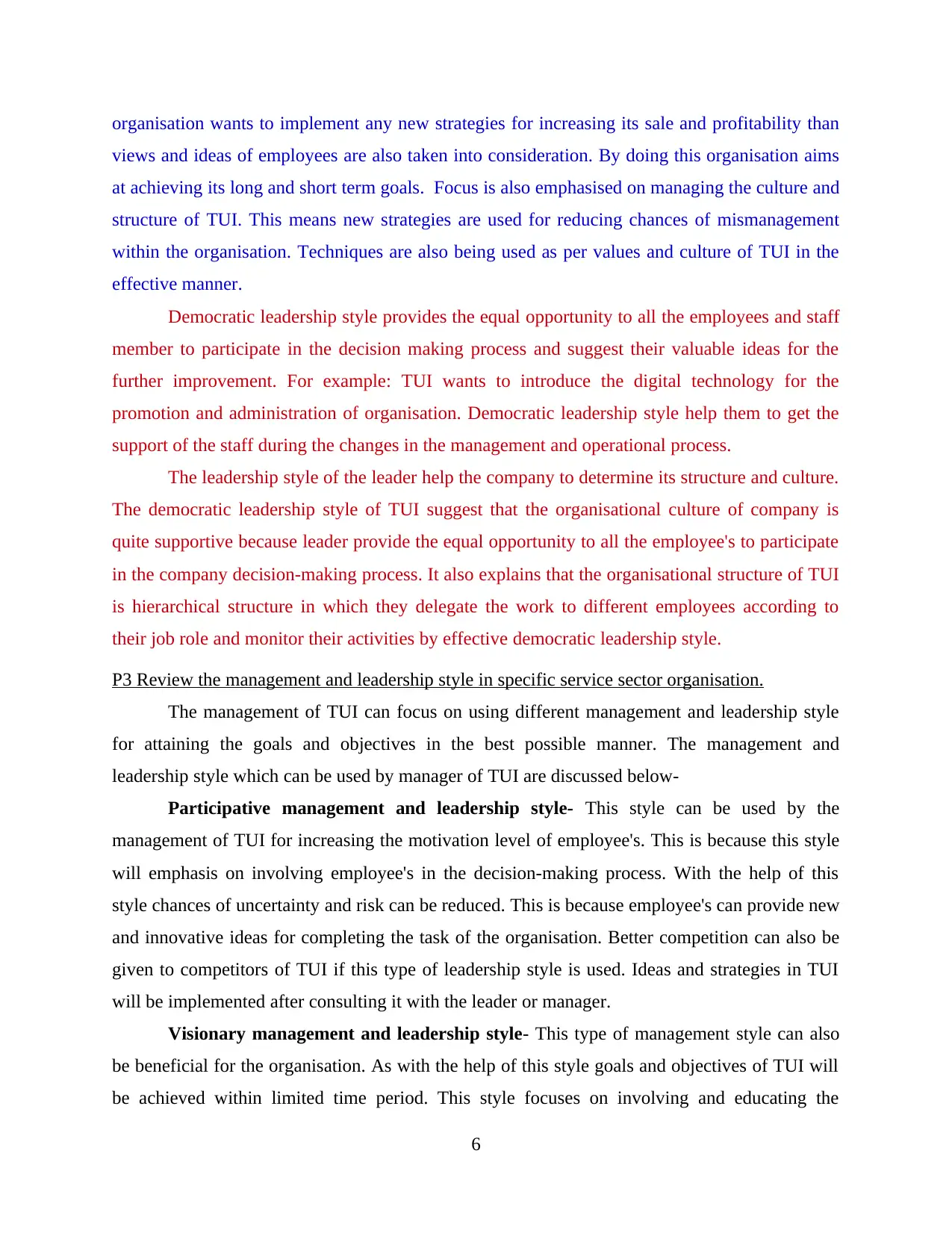
organisation wants to implement any new strategies for increasing its sale and profitability than
views and ideas of employees are also taken into consideration. By doing this organisation aims
at achieving its long and short term goals. Focus is also emphasised on managing the culture and
structure of TUI. This means new strategies are used for reducing chances of mismanagement
within the organisation. Techniques are also being used as per values and culture of TUI in the
effective manner.
Democratic leadership style provides the equal opportunity to all the employees and staff
member to participate in the decision making process and suggest their valuable ideas for the
further improvement. For example: TUI wants to introduce the digital technology for the
promotion and administration of organisation. Democratic leadership style help them to get the
support of the staff during the changes in the management and operational process.
The leadership style of the leader help the company to determine its structure and culture.
The democratic leadership style of TUI suggest that the organisational culture of company is
quite supportive because leader provide the equal opportunity to all the employee's to participate
in the company decision-making process. It also explains that the organisational structure of TUI
is hierarchical structure in which they delegate the work to different employees according to
their job role and monitor their activities by effective democratic leadership style.
P3 Review the management and leadership style in specific service sector organisation.
The management of TUI can focus on using different management and leadership style
for attaining the goals and objectives in the best possible manner. The management and
leadership style which can be used by manager of TUI are discussed below-
Participative management and leadership style- This style can be used by the
management of TUI for increasing the motivation level of employee's. This is because this style
will emphasis on involving employee's in the decision-making process. With the help of this
style chances of uncertainty and risk can be reduced. This is because employee's can provide new
and innovative ideas for completing the task of the organisation. Better competition can also be
given to competitors of TUI if this type of leadership style is used. Ideas and strategies in TUI
will be implemented after consulting it with the leader or manager.
Visionary management and leadership style- This type of management style can also
be beneficial for the organisation. As with the help of this style goals and objectives of TUI will
be achieved within limited time period. This style focuses on involving and educating the
6
views and ideas of employees are also taken into consideration. By doing this organisation aims
at achieving its long and short term goals. Focus is also emphasised on managing the culture and
structure of TUI. This means new strategies are used for reducing chances of mismanagement
within the organisation. Techniques are also being used as per values and culture of TUI in the
effective manner.
Democratic leadership style provides the equal opportunity to all the employees and staff
member to participate in the decision making process and suggest their valuable ideas for the
further improvement. For example: TUI wants to introduce the digital technology for the
promotion and administration of organisation. Democratic leadership style help them to get the
support of the staff during the changes in the management and operational process.
The leadership style of the leader help the company to determine its structure and culture.
The democratic leadership style of TUI suggest that the organisational culture of company is
quite supportive because leader provide the equal opportunity to all the employee's to participate
in the company decision-making process. It also explains that the organisational structure of TUI
is hierarchical structure in which they delegate the work to different employees according to
their job role and monitor their activities by effective democratic leadership style.
P3 Review the management and leadership style in specific service sector organisation.
The management of TUI can focus on using different management and leadership style
for attaining the goals and objectives in the best possible manner. The management and
leadership style which can be used by manager of TUI are discussed below-
Participative management and leadership style- This style can be used by the
management of TUI for increasing the motivation level of employee's. This is because this style
will emphasis on involving employee's in the decision-making process. With the help of this
style chances of uncertainty and risk can be reduced. This is because employee's can provide new
and innovative ideas for completing the task of the organisation. Better competition can also be
given to competitors of TUI if this type of leadership style is used. Ideas and strategies in TUI
will be implemented after consulting it with the leader or manager.
Visionary management and leadership style- This type of management style can also
be beneficial for the organisation. As with the help of this style goals and objectives of TUI will
be achieved within limited time period. This style focuses on involving and educating the
6
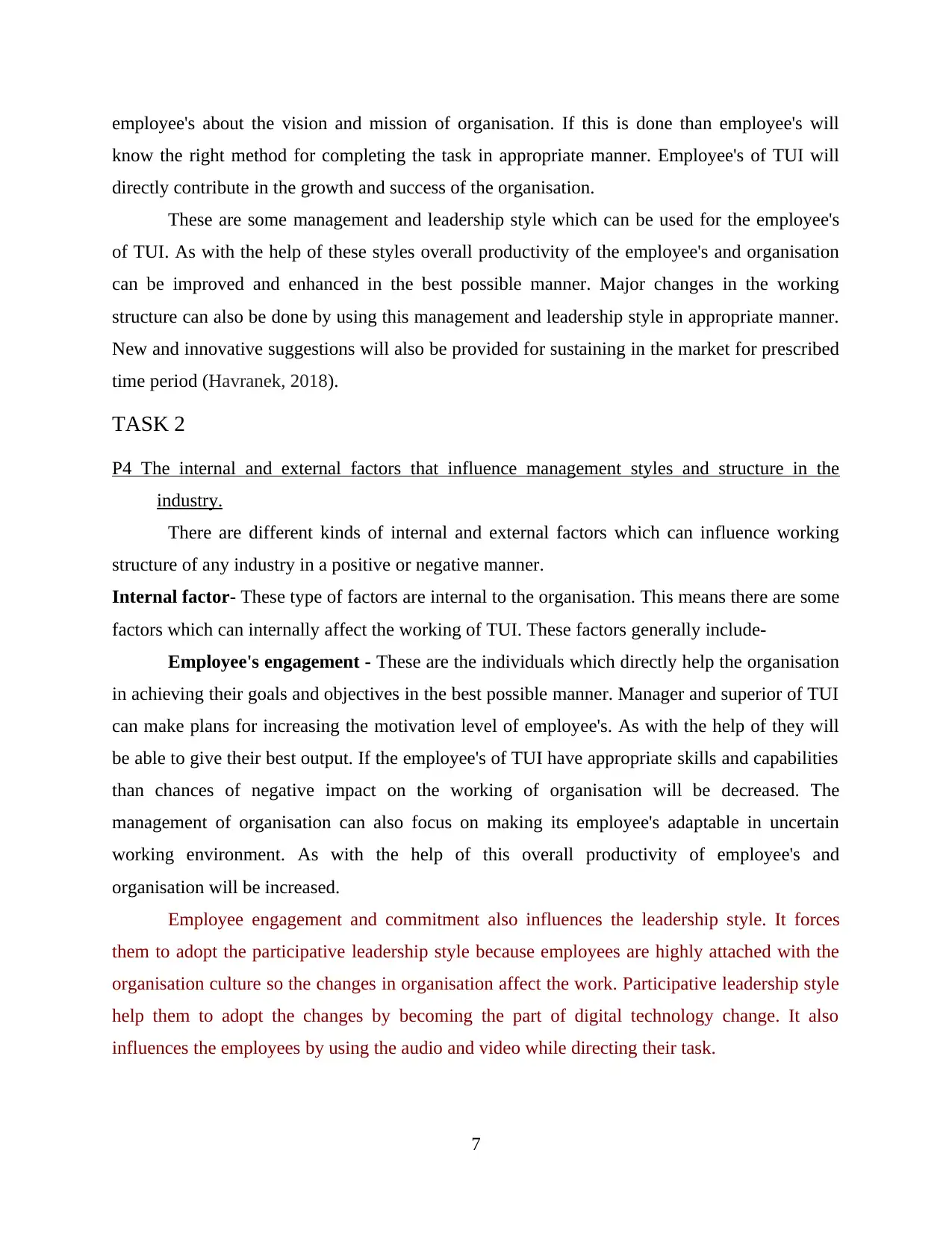
employee's about the vision and mission of organisation. If this is done than employee's will
know the right method for completing the task in appropriate manner. Employee's of TUI will
directly contribute in the growth and success of the organisation.
These are some management and leadership style which can be used for the employee's
of TUI. As with the help of these styles overall productivity of the employee's and organisation
can be improved and enhanced in the best possible manner. Major changes in the working
structure can also be done by using this management and leadership style in appropriate manner.
New and innovative suggestions will also be provided for sustaining in the market for prescribed
time period (Havranek, 2018).
TASK 2
P4 The internal and external factors that influence management styles and structure in the
industry.
There are different kinds of internal and external factors which can influence working
structure of any industry in a positive or negative manner.
Internal factor- These type of factors are internal to the organisation. This means there are some
factors which can internally affect the working of TUI. These factors generally include-
Employee's engagement - These are the individuals which directly help the organisation
in achieving their goals and objectives in the best possible manner. Manager and superior of TUI
can make plans for increasing the motivation level of employee's. As with the help of they will
be able to give their best output. If the employee's of TUI have appropriate skills and capabilities
than chances of negative impact on the working of organisation will be decreased. The
management of organisation can also focus on making its employee's adaptable in uncertain
working environment. As with the help of this overall productivity of employee's and
organisation will be increased.
Employee engagement and commitment also influences the leadership style. It forces
them to adopt the participative leadership style because employees are highly attached with the
organisation culture so the changes in organisation affect the work. Participative leadership style
help them to adopt the changes by becoming the part of digital technology change. It also
influences the employees by using the audio and video while directing their task.
7
know the right method for completing the task in appropriate manner. Employee's of TUI will
directly contribute in the growth and success of the organisation.
These are some management and leadership style which can be used for the employee's
of TUI. As with the help of these styles overall productivity of the employee's and organisation
can be improved and enhanced in the best possible manner. Major changes in the working
structure can also be done by using this management and leadership style in appropriate manner.
New and innovative suggestions will also be provided for sustaining in the market for prescribed
time period (Havranek, 2018).
TASK 2
P4 The internal and external factors that influence management styles and structure in the
industry.
There are different kinds of internal and external factors which can influence working
structure of any industry in a positive or negative manner.
Internal factor- These type of factors are internal to the organisation. This means there are some
factors which can internally affect the working of TUI. These factors generally include-
Employee's engagement - These are the individuals which directly help the organisation
in achieving their goals and objectives in the best possible manner. Manager and superior of TUI
can make plans for increasing the motivation level of employee's. As with the help of they will
be able to give their best output. If the employee's of TUI have appropriate skills and capabilities
than chances of negative impact on the working of organisation will be decreased. The
management of organisation can also focus on making its employee's adaptable in uncertain
working environment. As with the help of this overall productivity of employee's and
organisation will be increased.
Employee engagement and commitment also influences the leadership style. It forces
them to adopt the participative leadership style because employees are highly attached with the
organisation culture so the changes in organisation affect the work. Participative leadership style
help them to adopt the changes by becoming the part of digital technology change. It also
influences the employees by using the audio and video while directing their task.
7
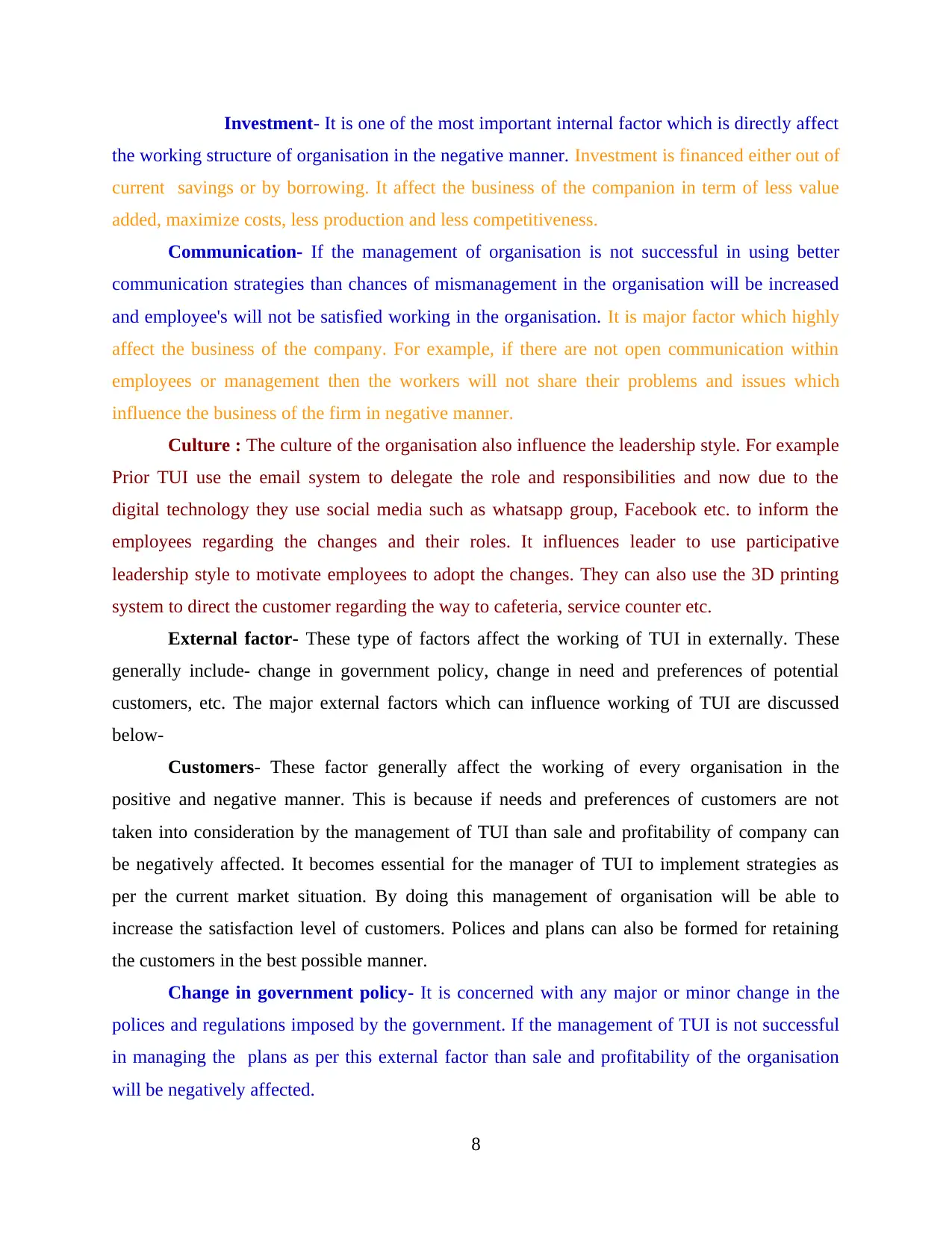
Investment- It is one of the most important internal factor which is directly affect
the working structure of organisation in the negative manner. Investment is financed either out of
current savings or by borrowing. It affect the business of the companion in term of less value
added, maximize costs, less production and less competitiveness.
Communication- If the management of organisation is not successful in using better
communication strategies than chances of mismanagement in the organisation will be increased
and employee's will not be satisfied working in the organisation. It is major factor which highly
affect the business of the company. For example, if there are not open communication within
employees or management then the workers will not share their problems and issues which
influence the business of the firm in negative manner.
Culture : The culture of the organisation also influence the leadership style. For example
Prior TUI use the email system to delegate the role and responsibilities and now due to the
digital technology they use social media such as whatsapp group, Facebook etc. to inform the
employees regarding the changes and their roles. It influences leader to use participative
leadership style to motivate employees to adopt the changes. They can also use the 3D printing
system to direct the customer regarding the way to cafeteria, service counter etc.
External factor- These type of factors affect the working of TUI in externally. These
generally include- change in government policy, change in need and preferences of potential
customers, etc. The major external factors which can influence working of TUI are discussed
below-
Customers- These factor generally affect the working of every organisation in the
positive and negative manner. This is because if needs and preferences of customers are not
taken into consideration by the management of TUI than sale and profitability of company can
be negatively affected. It becomes essential for the manager of TUI to implement strategies as
per the current market situation. By doing this management of organisation will be able to
increase the satisfaction level of customers. Polices and plans can also be formed for retaining
the customers in the best possible manner.
Change in government policy- It is concerned with any major or minor change in the
polices and regulations imposed by the government. If the management of TUI is not successful
in managing the plans as per this external factor than sale and profitability of the organisation
will be negatively affected.
8
the working structure of organisation in the negative manner. Investment is financed either out of
current savings or by borrowing. It affect the business of the companion in term of less value
added, maximize costs, less production and less competitiveness.
Communication- If the management of organisation is not successful in using better
communication strategies than chances of mismanagement in the organisation will be increased
and employee's will not be satisfied working in the organisation. It is major factor which highly
affect the business of the company. For example, if there are not open communication within
employees or management then the workers will not share their problems and issues which
influence the business of the firm in negative manner.
Culture : The culture of the organisation also influence the leadership style. For example
Prior TUI use the email system to delegate the role and responsibilities and now due to the
digital technology they use social media such as whatsapp group, Facebook etc. to inform the
employees regarding the changes and their roles. It influences leader to use participative
leadership style to motivate employees to adopt the changes. They can also use the 3D printing
system to direct the customer regarding the way to cafeteria, service counter etc.
External factor- These type of factors affect the working of TUI in externally. These
generally include- change in government policy, change in need and preferences of potential
customers, etc. The major external factors which can influence working of TUI are discussed
below-
Customers- These factor generally affect the working of every organisation in the
positive and negative manner. This is because if needs and preferences of customers are not
taken into consideration by the management of TUI than sale and profitability of company can
be negatively affected. It becomes essential for the manager of TUI to implement strategies as
per the current market situation. By doing this management of organisation will be able to
increase the satisfaction level of customers. Polices and plans can also be formed for retaining
the customers in the best possible manner.
Change in government policy- It is concerned with any major or minor change in the
polices and regulations imposed by the government. If the management of TUI is not successful
in managing the plans as per this external factor than sale and profitability of the organisation
will be negatively affected.
8
Secure Best Marks with AI Grader
Need help grading? Try our AI Grader for instant feedback on your assignments.
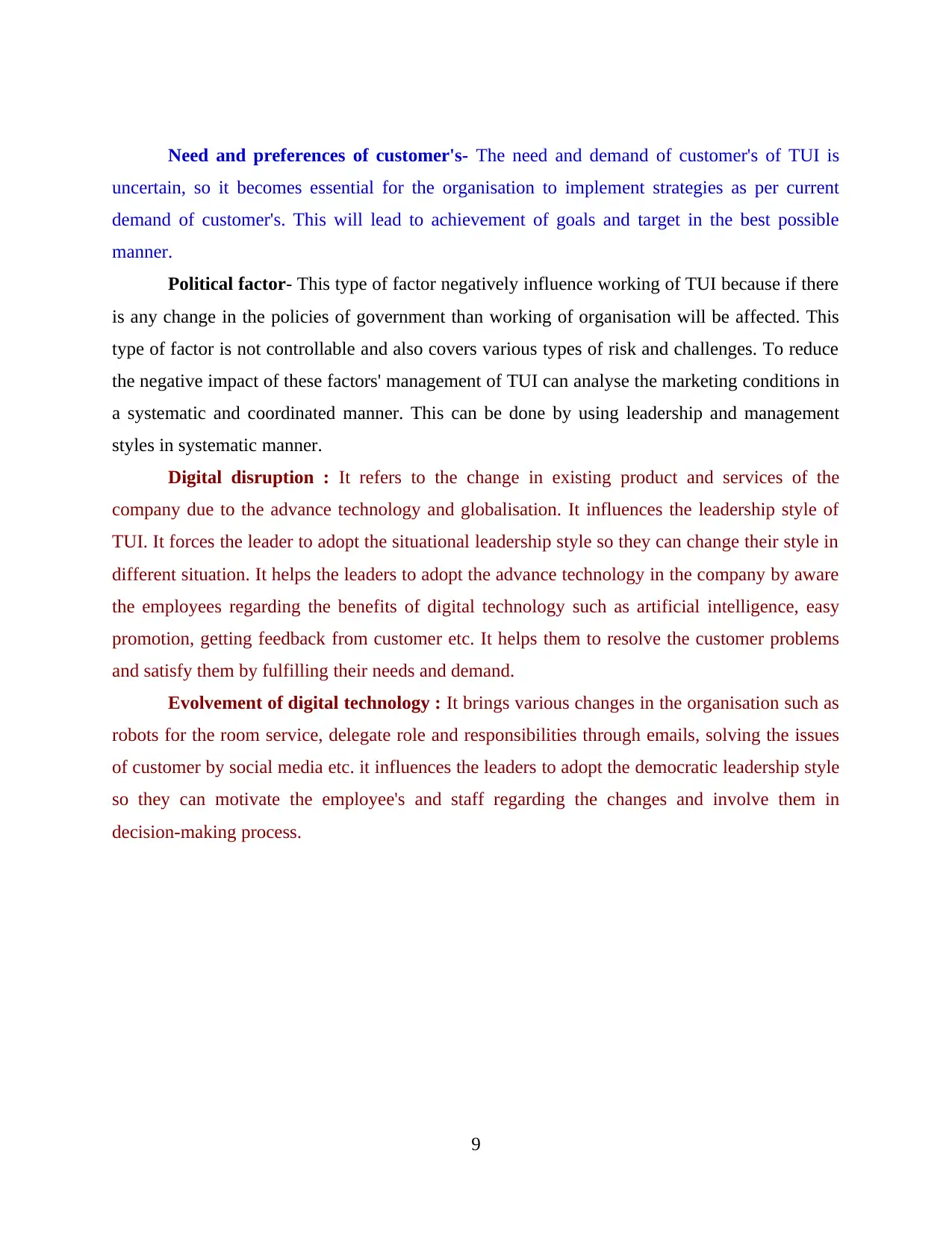
Need and preferences of customer's- The need and demand of customer's of TUI is
uncertain, so it becomes essential for the organisation to implement strategies as per current
demand of customer's. This will lead to achievement of goals and target in the best possible
manner.
Political factor- This type of factor negatively influence working of TUI because if there
is any change in the policies of government than working of organisation will be affected. This
type of factor is not controllable and also covers various types of risk and challenges. To reduce
the negative impact of these factors' management of TUI can analyse the marketing conditions in
a systematic and coordinated manner. This can be done by using leadership and management
styles in systematic manner.
Digital disruption : It refers to the change in existing product and services of the
company due to the advance technology and globalisation. It influences the leadership style of
TUI. It forces the leader to adopt the situational leadership style so they can change their style in
different situation. It helps the leaders to adopt the advance technology in the company by aware
the employees regarding the benefits of digital technology such as artificial intelligence, easy
promotion, getting feedback from customer etc. It helps them to resolve the customer problems
and satisfy them by fulfilling their needs and demand.
Evolvement of digital technology : It brings various changes in the organisation such as
robots for the room service, delegate role and responsibilities through emails, solving the issues
of customer by social media etc. it influences the leaders to adopt the democratic leadership style
so they can motivate the employee's and staff regarding the changes and involve them in
decision-making process.
9
uncertain, so it becomes essential for the organisation to implement strategies as per current
demand of customer's. This will lead to achievement of goals and target in the best possible
manner.
Political factor- This type of factor negatively influence working of TUI because if there
is any change in the policies of government than working of organisation will be affected. This
type of factor is not controllable and also covers various types of risk and challenges. To reduce
the negative impact of these factors' management of TUI can analyse the marketing conditions in
a systematic and coordinated manner. This can be done by using leadership and management
styles in systematic manner.
Digital disruption : It refers to the change in existing product and services of the
company due to the advance technology and globalisation. It influences the leadership style of
TUI. It forces the leader to adopt the situational leadership style so they can change their style in
different situation. It helps the leaders to adopt the advance technology in the company by aware
the employees regarding the benefits of digital technology such as artificial intelligence, easy
promotion, getting feedback from customer etc. It helps them to resolve the customer problems
and satisfy them by fulfilling their needs and demand.
Evolvement of digital technology : It brings various changes in the organisation such as
robots for the room service, delegate role and responsibilities through emails, solving the issues
of customer by social media etc. it influences the leaders to adopt the democratic leadership style
so they can motivate the employee's and staff regarding the changes and involve them in
decision-making process.
9
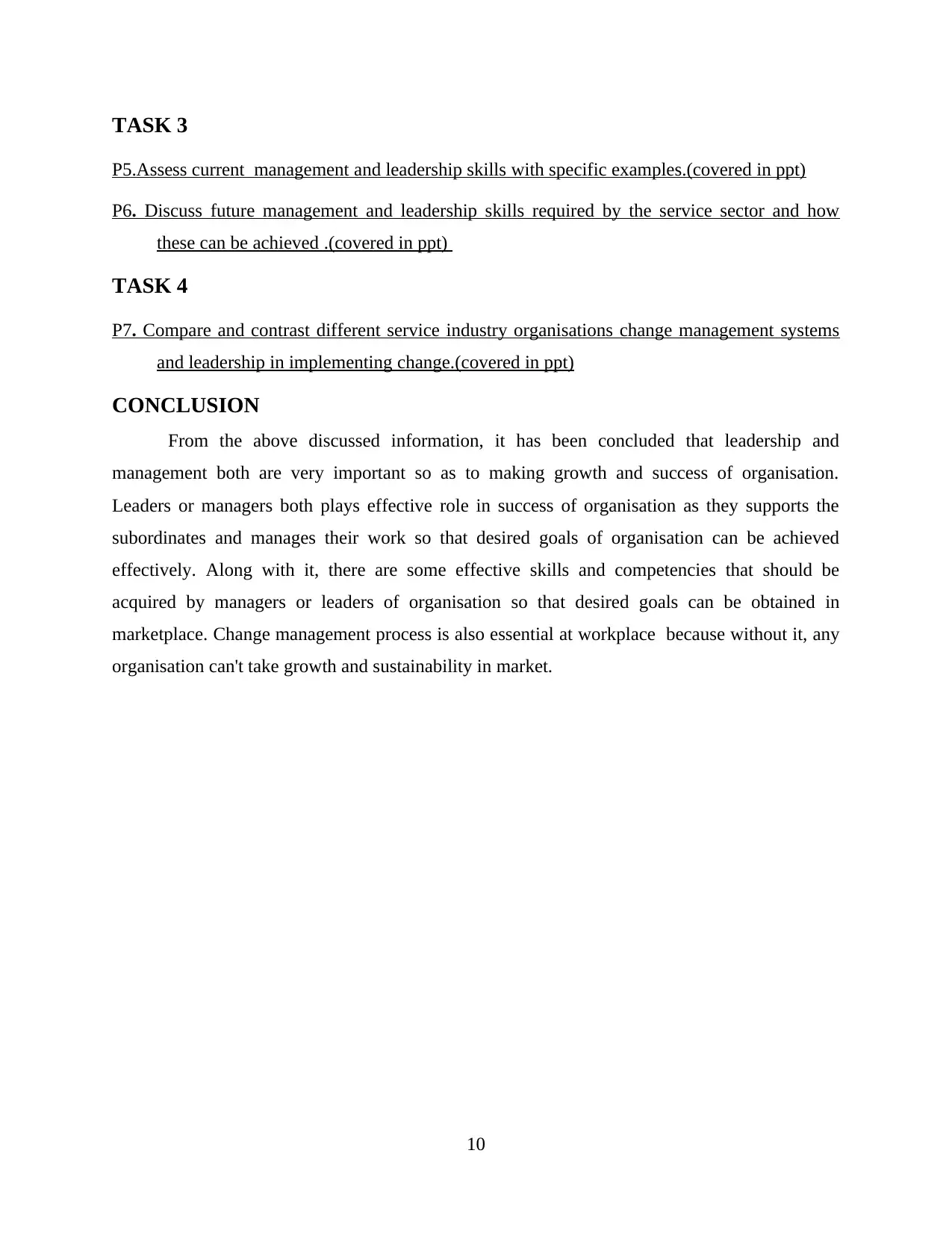
TASK 3
P5.Assess current management and leadership skills with specific examples.(covered in ppt)
P6. Discuss future management and leadership skills required by the service sector and how
these can be achieved .(covered in ppt)
TASK 4
P7. Compare and contrast different service industry organisations change management systems
and leadership in implementing change.(covered in ppt)
CONCLUSION
From the above discussed information, it has been concluded that leadership and
management both are very important so as to making growth and success of organisation.
Leaders or managers both plays effective role in success of organisation as they supports the
subordinates and manages their work so that desired goals of organisation can be achieved
effectively. Along with it, there are some effective skills and competencies that should be
acquired by managers or leaders of organisation so that desired goals can be obtained in
marketplace. Change management process is also essential at workplace because without it, any
organisation can't take growth and sustainability in market.
10
P5.Assess current management and leadership skills with specific examples.(covered in ppt)
P6. Discuss future management and leadership skills required by the service sector and how
these can be achieved .(covered in ppt)
TASK 4
P7. Compare and contrast different service industry organisations change management systems
and leadership in implementing change.(covered in ppt)
CONCLUSION
From the above discussed information, it has been concluded that leadership and
management both are very important so as to making growth and success of organisation.
Leaders or managers both plays effective role in success of organisation as they supports the
subordinates and manages their work so that desired goals of organisation can be achieved
effectively. Along with it, there are some effective skills and competencies that should be
acquired by managers or leaders of organisation so that desired goals can be obtained in
marketplace. Change management process is also essential at workplace because without it, any
organisation can't take growth and sustainability in market.
10
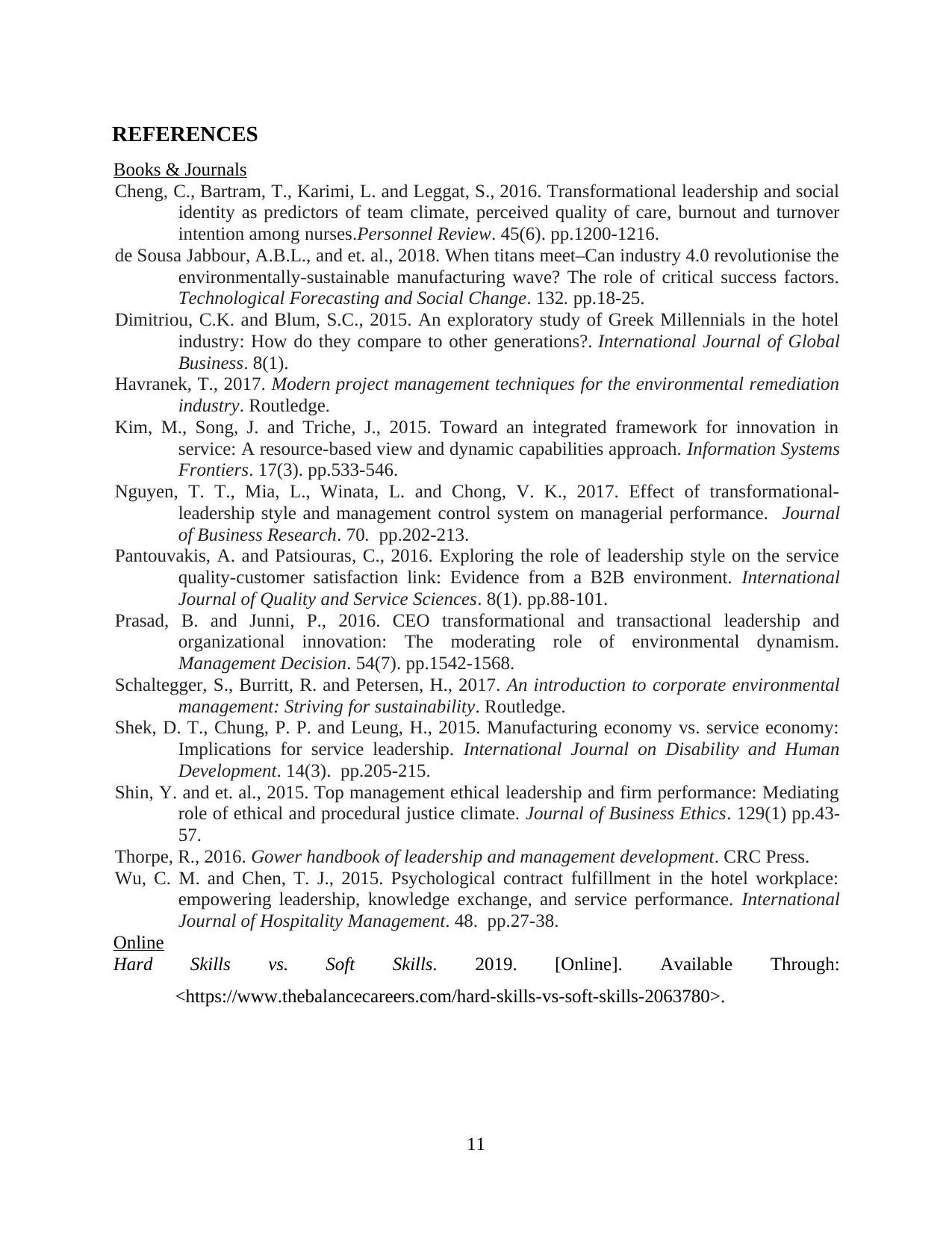
REFERENCES
Books & Journals
Cheng, C., Bartram, T., Karimi, L. and Leggat, S., 2016. Transformational leadership and social
identity as predictors of team climate, perceived quality of care, burnout and turnover
intention among nurses.Personnel Review. 45(6). pp.1200-1216.
de Sousa Jabbour, A.B.L., and et. al., 2018. When titans meet–Can industry 4.0 revolutionise the
environmentally-sustainable manufacturing wave? The role of critical success factors.
Technological Forecasting and Social Change. 132. pp.18-25.
Dimitriou, C.K. and Blum, S.C., 2015. An exploratory study of Greek Millennials in the hotel
industry: How do they compare to other generations?. International Journal of Global
Business. 8(1).
Havranek, T., 2017. Modern project management techniques for the environmental remediation
industry. Routledge.
Kim, M., Song, J. and Triche, J., 2015. Toward an integrated framework for innovation in
service: A resource-based view and dynamic capabilities approach. Information Systems
Frontiers. 17(3). pp.533-546.
Nguyen, T. T., Mia, L., Winata, L. and Chong, V. K., 2017. Effect of transformational-
leadership style and management control system on managerial performance. Journal
of Business Research. 70. pp.202-213.
Pantouvakis, A. and Patsiouras, C., 2016. Exploring the role of leadership style on the service
quality-customer satisfaction link: Evidence from a B2B environment. International
Journal of Quality and Service Sciences. 8(1). pp.88-101.
Prasad, B. and Junni, P., 2016. CEO transformational and transactional leadership and
organizational innovation: The moderating role of environmental dynamism.
Management Decision. 54(7). pp.1542-1568.
Schaltegger, S., Burritt, R. and Petersen, H., 2017. An introduction to corporate environmental
management: Striving for sustainability. Routledge.
Shek, D. T., Chung, P. P. and Leung, H., 2015. Manufacturing economy vs. service economy:
Implications for service leadership. International Journal on Disability and Human
Development. 14(3). pp.205-215.
Shin, Y. and et. al., 2015. Top management ethical leadership and firm performance: Mediating
role of ethical and procedural justice climate. Journal of Business Ethics. 129(1) pp.43-
57.
Thorpe, R., 2016. Gower handbook of leadership and management development. CRC Press.
Wu, C. M. and Chen, T. J., 2015. Psychological contract fulfillment in the hotel workplace:
empowering leadership, knowledge exchange, and service performance. International
Journal of Hospitality Management. 48. pp.27-38.
Online
Hard Skills vs. Soft Skills. 2019. [Online]. Available Through:
<https://www.thebalancecareers.com/hard-skills-vs-soft-skills-2063780>.
11
Books & Journals
Cheng, C., Bartram, T., Karimi, L. and Leggat, S., 2016. Transformational leadership and social
identity as predictors of team climate, perceived quality of care, burnout and turnover
intention among nurses.Personnel Review. 45(6). pp.1200-1216.
de Sousa Jabbour, A.B.L., and et. al., 2018. When titans meet–Can industry 4.0 revolutionise the
environmentally-sustainable manufacturing wave? The role of critical success factors.
Technological Forecasting and Social Change. 132. pp.18-25.
Dimitriou, C.K. and Blum, S.C., 2015. An exploratory study of Greek Millennials in the hotel
industry: How do they compare to other generations?. International Journal of Global
Business. 8(1).
Havranek, T., 2017. Modern project management techniques for the environmental remediation
industry. Routledge.
Kim, M., Song, J. and Triche, J., 2015. Toward an integrated framework for innovation in
service: A resource-based view and dynamic capabilities approach. Information Systems
Frontiers. 17(3). pp.533-546.
Nguyen, T. T., Mia, L., Winata, L. and Chong, V. K., 2017. Effect of transformational-
leadership style and management control system on managerial performance. Journal
of Business Research. 70. pp.202-213.
Pantouvakis, A. and Patsiouras, C., 2016. Exploring the role of leadership style on the service
quality-customer satisfaction link: Evidence from a B2B environment. International
Journal of Quality and Service Sciences. 8(1). pp.88-101.
Prasad, B. and Junni, P., 2016. CEO transformational and transactional leadership and
organizational innovation: The moderating role of environmental dynamism.
Management Decision. 54(7). pp.1542-1568.
Schaltegger, S., Burritt, R. and Petersen, H., 2017. An introduction to corporate environmental
management: Striving for sustainability. Routledge.
Shek, D. T., Chung, P. P. and Leung, H., 2015. Manufacturing economy vs. service economy:
Implications for service leadership. International Journal on Disability and Human
Development. 14(3). pp.205-215.
Shin, Y. and et. al., 2015. Top management ethical leadership and firm performance: Mediating
role of ethical and procedural justice climate. Journal of Business Ethics. 129(1) pp.43-
57.
Thorpe, R., 2016. Gower handbook of leadership and management development. CRC Press.
Wu, C. M. and Chen, T. J., 2015. Psychological contract fulfillment in the hotel workplace:
empowering leadership, knowledge exchange, and service performance. International
Journal of Hospitality Management. 48. pp.27-38.
Online
Hard Skills vs. Soft Skills. 2019. [Online]. Available Through:
<https://www.thebalancecareers.com/hard-skills-vs-soft-skills-2063780>.
11
1 out of 13
Related Documents
Your All-in-One AI-Powered Toolkit for Academic Success.
+13062052269
info@desklib.com
Available 24*7 on WhatsApp / Email
![[object Object]](/_next/static/media/star-bottom.7253800d.svg)
Unlock your academic potential
© 2024 | Zucol Services PVT LTD | All rights reserved.





